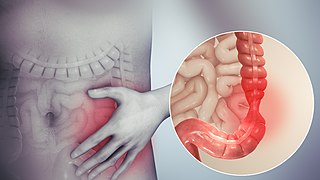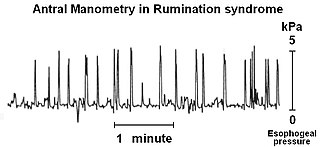
Constipation is a bowel dysfunction that makes bowel movements infrequent or hard to pass. The stool is often hard and dry. Other symptoms may include abdominal pain, bloating, and feeling as if one has not completely passed the bowel movement. Complications from constipation may include hemorrhoids, anal fissure or fecal impaction. The normal frequency of bowel movements in adults is between three per day and three per week. Babies often have three to four bowel movements per day while young children typically have two to three per day.

Irritable bowel syndrome (IBS) is a functional gastrointestinal disorder characterized by a group of symptoms that commonly include abdominal pain, abdominal bloating and changes in the consistency of bowel movements. These symptoms may occur over a long time, sometimes for years. IBS can negatively affect quality of life and may result in missed school or work or reduced productivity at work. Disorders such as anxiety, major depression, and chronic fatigue syndrome are common among people with IBS.

Somatization disorder was a mental and behavioral disorder characterized by recurring, multiple, and current, clinically significant complaints about somatic symptoms. It was recognized in the DSM-IV-TR classification system, but in the latest version DSM-5, it was combined with undifferentiated somatoform disorder to become somatic symptom disorder, a diagnosis which no longer requires a specific number of somatic symptoms. ICD-10, the latest version of the International Statistical Classification of Diseases and Related Health Problems, still includes somatization syndrome.
Functional abdominal pain syndrome (FAPS), chronic functional abdominal pain (CFAP), or centrally mediated abdominal pain syndrome (CMAP) is a pain syndrome of the abdomen, that has been present for at least six months, is not well connected to gastrointestinal function, and is accompanied by some loss of everyday activities. The discomfort is persistent, near-constant, or regularly reoccurring. The absence of symptom association with food intake or defecation distinguishes functional abdominal pain syndrome from other functional gastrointestinal illnesses, such as irritable bowel syndrome (IBS) and functional dyspepsia.

Conversion disorder (CD), or functional neurologic symptom disorder, is a diagnostic category used in some psychiatric classification systems. It is sometimes applied to patients who present with neurological symptoms, such as numbness, blindness, paralysis, or fits, which are not consistent with a well-established organic cause, which cause significant distress, and can be traced back to a psychological trigger. It is thought that these symptoms arise in response to stressful situations affecting a patient's mental health or an ongoing mental health condition such as depression. Conversion disorder was retained in DSM-5, but given the subtitle functional neurological symptom disorder. The new criteria cover the same range of symptoms, but remove the requirements for a psychological stressor to be present and for feigning to be disproved. The ICD-10 classifies conversion disorder as a dissociative disorder, and the ICD-11 as a dissociative disorder with unspecified neurological symptoms. However, the DSM-IV classifies conversion disorder as a somatoform disorder.
Functional gastrointestinal disorders (FGID), also known as disorders of gut–brain interaction, include a number of separate idiopathic disorders which affect different parts of the gastrointestinal tract and involve visceral hypersensitivity and motility disturbances.
Functional constipation, known as chronic idiopathic constipation (CIC), is constipation that does not have a physical (anatomical) or physiological cause. It may have a neurological, psychological or psychosomatic cause. A person with functional constipation may be healthy, yet has difficulty defecating.

Rumination syndrome, or merycism, is a chronic motility disorder characterized by effortless regurgitation of most meals following consumption, due to the involuntary contraction of the muscles around the abdomen. There is no retching, nausea, heartburn, odour, or abdominal pain associated with the regurgitation as there is with typical vomiting, and the regurgitated food is undigested. The disorder has been historically documented as affecting only infants, young children, and people with cognitive disabilities . It is increasingly being diagnosed in a greater number of otherwise healthy adolescents and adults, though there is a lack of awareness of the condition by doctors, patients, and the general public.
Da Costa's syndrome, also known as soldier's heart among other names, was a syndrome or a set of symptoms similar to those of heart disease. These include fatigue upon exertion, shortness of breath, palpitations, sweating, chest pain, and sometimes orthostatic intolerance. It was originally thought to be a cardiac condition, and treated with a predecessor to modern cardiac drugs. In modern times, it is believed to represent several unrelated disorders, some of which have a known medical basis.
Medically unexplained physical symptoms are symptoms for which a treating physician or other healthcare providers have found no medical cause, or whose cause remains contested. In its strictest sense, the term simply means that the cause for the symptoms is unknown or disputed—there is no scientific consensus. Not all medically unexplained symptoms are influenced by identifiable psychological factors. However, in practice, most physicians and authors who use the term consider that the symptoms most likely arise from psychological causes. Typically, the possibility that MUPS are caused by prescription drugs or other drugs is ignored. It is estimated that between 15% and 30% of all primary care consultations are for medically unexplained symptoms. A large Canadian community survey revealed that the most common medically unexplained symptoms are musculoskeletal pain, ear, nose, and throat symptoms, abdominal pain and gastrointestinal symptoms, fatigue, and dizziness. The term MUPS can also be used to refer to syndromes whose etiology remains contested, including chronic fatigue syndrome, fibromyalgia, multiple chemical sensitivity and Gulf War illness.
Functional disorders are a group of recognisable medical conditions which are due to changes to the functioning of the systems of the body rather than due to a disease affecting the structure of the body.
The differential diagnoses of anorexia nervosa (AN) includes various types of medical and psychological conditions, which may be misdiagnosed as AN. In some cases, these conditions may be comorbid with AN because the misdiagnosis of AN is not uncommon. For example, a case of achalasia was misdiagnosed as AN and the patient spent two months confined to a psychiatric hospital. A reason for the differential diagnoses that surround AN arise mainly because, like other disorders, it is primarily, albeit defensively and adaptive for, the individual concerned. Anorexia Nervosa is a psychological disorder characterized by extremely reduced intake of food. People with anorexia nervosa tend to have a low self-image and an inaccurate perception of their body.

Depression, one of the most commonly diagnosed psychiatric disorders, is being diagnosed in increasing numbers in various segments of the population worldwide. Depression in the United States alone affects 17.6 million Americans each year or 1 in 6 people. Depressed patients are at increased risk of type 2 diabetes, cardiovascular disease and suicide. Within the next twenty years depression is expected to become the second leading cause of disability worldwide and the leading cause in high-income nations, including the United States. In approximately 75% of suicides, the individuals had seen a physician within the prior year before their death, 45–66% within the prior month. About a third of those who died by suicide had contact with mental health services in the prior year, a fifth within the preceding month.

Myalgic encephalomyelitis/chronic fatigue syndrome (ME/CFS) is a debilitating long-term medical condition. People with ME/CFS experience delayed worsening of the illness after minor physical or mental activity, which is the hallmark symptom of the illness. Other core symptoms are a greatly reduced ability to do tasks that were previously routine, severe fatigue that does not improve much with rest, and sleep disturbances. Further common symptoms include dizziness or nausea when sitting or standing, along with memory and concentration issues and pain.
Somatic symptom disorder, also known as somatoform disorder, is defined by one or more chronic physical symptoms that coincide with excessive and maladaptive thoughts, emotions, and behaviors connected to those symptoms. The symptoms are not deliberately produced or feigned, and they may or may not coexist with a known medical ailment.
Abdominal migraine(AM) is a functional disorder that usually manifests in childhood and adolescence, without a clear pathologic mechanism or biochemical irregularity. Children frequently experience sporadic episodes of excruciating central abdominal pain accompanied by migrainous symptoms like nausea, vomiting, severe headaches, and general pallor. Abdominal migraine can be diagnosed based off clinical criteria and the exclusion of other disorders.

Orofacial pain is a general term covering any pain which is felt in the mouth, jaws and the face. Orofacial pain is a common symptom, and there are many causes.
Functional neurologic disorder or functional neurological disorder (FND) is a condition in which patients experience neurological symptoms such as weakness, movement disorders, sensory symptoms, and blackouts. As a functional disorder, there is by definition no known disease process affecting the structure of the body, yet the person experiences symptoms relating to their body function. Symptoms of functional neurological disorders are clinically recognisable, but are not categorically associated with a definable organic disease.
The term functional somatic syndrome (FSS) refers to a group of chronic diagnoses with no identifiable organic cause. This term was coined by Hemanth Samkumar. It encompasses disorders such as fibromyalgia, chronic widespread pain, temporomandibular disorder, irritable bowel syndrome, lower back pain, tension headache, atypical face pain, non-cardiac chest pain, insomnia, palpitation, dyspepsia and dizziness. General overlap exists between this term, somatization and somatoform. The status of ME/CFS as a functional somatic syndrome is contested. Although the aetiology remains unclear, there are consistent findings of biological abnormalities, and major health bodies such as the NAM, WHO, and NIH, classify it as an organic disease.
Idiopathic chronic fatigue (ICF) or chronic idiopathic fatigue or insufficient/idiopathic fatigue is a term used for cases of unexplained fatigue that have lasted at least six consecutive months and which do not meet the criteria for Myalgic Encephalomyelitis/chronic fatigue syndrome. Such fatigue is widely understood to have a profound effect on the lives of patients who experience it.






